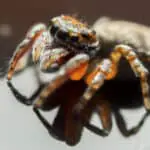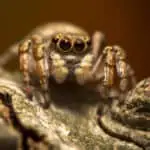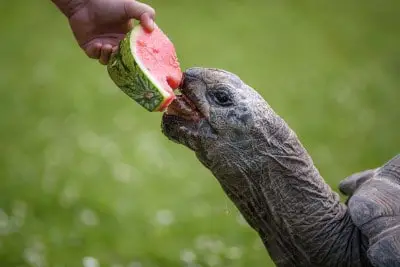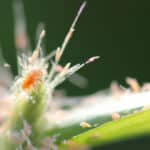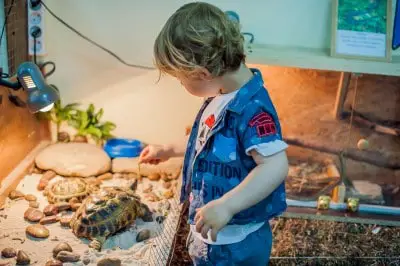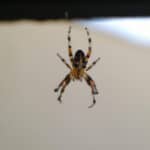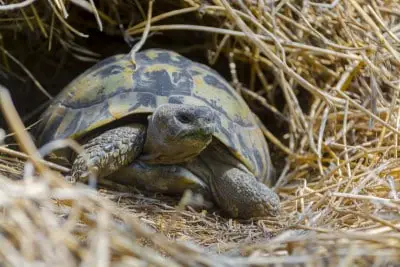Spiders are fascinating creatures. A lot of the things they do are unique to spiders alone. For example, they don’t even eat a lot. And this begs the question of whether they poop.
With many other animals and pets, you will be well aware of how and when they poop. But what about spiders?
Do spiders poop? Spiders do poop. Spiders can poop from once every few days to once every few months. Spider poop is made of undigested food substances and uric acid. Because of this, spider poop will vary in consistency from liquid to dry and color from white to dark brown or black.
Some people may think that spiders do use up everything they eat and produce no waste, but that is not true. In fact, you may be surprised as to the interesting facts surrounding spiders and their poop. So let’s take a look.
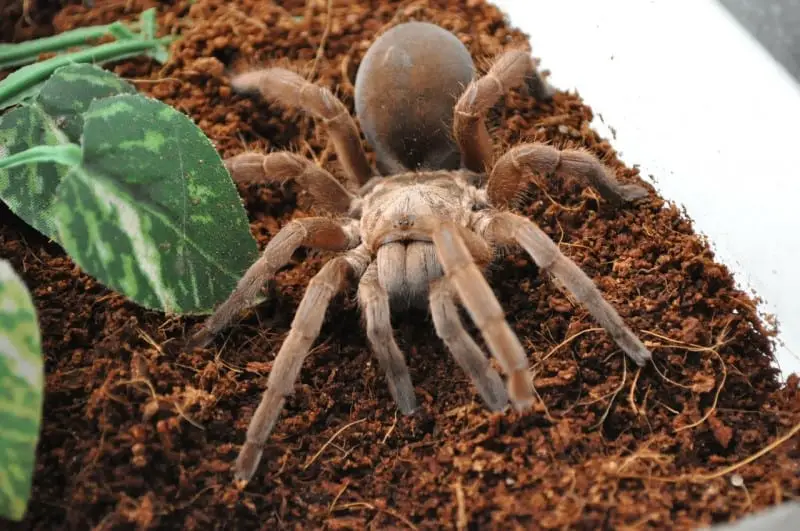
What Does Spider Poop Look Like?
Spider droppings consist of waste materials and indigestible food. Spiders feed on various types of animals like butterflies, flyes, mosquitoes, crickets, grasshoppers, other spiders, beetles, worms, and so much more.
Spiders cover their prey with digestive fluid, which predigests it for them. All the indigestible food parts will then pass the spider’s digestive tract and be excreted in the form of poop.
Spider poop is not solid. It is thick and liquidy. Most spider droppings resemble paint or ink stains and will appear as small drips or splats that are often black, brown, gray, or white.
However, there can be some exceptions.
Tarantula poop is usually larger in volume and more watery. There are small chunks or clusters of poop surrounded by liquid. Often owners will get worried as those chunks can resemble tiny cocoons or parasites.
The color of tarantula poop can vary from white to gray or black. It can resemble white rice, minuscule white pumpkin seeds or even bird poop. As it dries, it turns white and hardens up.
Tarantulas also possess the ability to kind of spray their poop. (Almost like a tiny water gun.)
In fact, tarantulas are well known for their aiming and shooting skills in that regard. (The whole process can also be quite audible.)
But that’s not all.
Tarantulas also produce boluses. Boluses look very similar to poop and thus is often confused with poop, however it is a type of a waste product. A bolus contains the uneaten parts of the prey, and it has nothing to do with poop.
Boluses will vary in color and size. Sometimes the bolus can be very small and with the same color as the substrate, making it virtually impossible to spot. In some cases, the tarantula may not leave any bolus behind, so it is not a big deal if you do not see any boluses.
Common house spider poop is usually found in small quantities and may not really give off any noticeable smells. However, larger spiders like the tarantulas, for example, do produce larger in size poop, which can be very smelly.
What Is Spider Poop Made Of?
Spider poop is viscous and liquidy because it is actually a mixture of poop and pee. To spiders, water is a precious resource, and they have evolved to preserve as much of it as possible. This is why spiders don’t exactly pee—they produce uric acid, which is combined and excreted in combination with the solid waste.
One of the questions some people have asked me is whether spider webs are made of poop.
Spider webs are not made of poop. Spider webs are made from silk, which is made from different proteins inside the spider’s silk glands. The web is excreted through the spinnerets, which are located near the anus. In contrast, spider poop comprises undigested food that has passed the digestive system and is excreted through the anus.
Although the spinnerets and the anus are located close to each other, they are two fundamentally different systems that are not connected in any way.
How Often Do Spiders Poop?
Not all spiders are the same. For example, there is a big difference between a tarantula and a jumping spider.
Spiders have a slower metabolism and will usually poop less often than many other—and bigger—animals.
In general, spiders will poop once every few days to once every few months, depending on food availability, living conditions, their health, and the spider species.
Although pooping is a normal physiological process found in all animals that consume food, spiders can also poop as a defense mechanism to ward off predators.
Where Do Spiders Poop?
Where there are spiders, there will also be spider poop. In other words, spider poop can usually be found underneath spider webs. Spiders do not normally poop in their webs but below, near, away from them.
Spider poop can often be found on walls, floors, windowsills, skirting boards, and other surfaces.
Tarantulas, on the other hand, will often poop on the glass or walls of their enclosure. Tarantulas, in general, like to keep their enclosure and immediate surroundings clean. This is why some would decide on a particular area or corner in their enclosure where they will poop.
That said, not all tarantulas are like that, and some will be very messy. For example, arboreal tarantulas like to poop in different areas of the enclosure (including the enclosure doors), and other tarantulas will often poop in their water bowls.
Is Spider Poop Toxic?
We are all well aware that animal feces and droppings are not sanitary and can carry various bacteria, viruses, and parasites.
Although poop, in general, is not considered highly toxic (In fact, the Illinois Poison Center considers poop to be minimally toxic), it can cause a person to become ill.
This fact applies to the feces produced by both humans and animals, including spiders. It is true you may need to be in contact with high amounts of spider poop (which can be nearly impossible to happen), but spider poop can be potentially dangerous and toxic.
Conversely, one study aimed to see how likely it is to find harmful pathogenic bacteria in a spider’s poop (in this case, a Black Widow) that has ingested filth flies carrying various pathogenic bacterias.
Interestingly no pathogenic bacterias were found in the spider’s poop despite being present in its food source. Experts theorized that this might be caused due to the potential antimicrobial properties of spiders’ venom and blood.
In any case, it is recommended to clean off spider poop as soon as possible and do not allow it to accumulate.
Can You Clean Spider Poop?
The good news is that spider poop is very easy to clean—especially if you clean it before it has had time to dry off. You can clean spider poop using some water and a piece of cloth or a paper towel.
It is recommended to clean spider droppings as soon as possible as they can leave yellowish stains on certain surfaces if left to dry fully. If there is a yellowish stain, you can try to use slightly more aggressive cleaning products and stain removers, however, be mindful that some of these can damage certain surfaces. So make sure you are using the right product for the right surface.
However, when it comes to pet spiders like tarantulas, for example, things can get a little trickier—especially considering how cluttered the tank can be.
When people are considering getting a pet tarantula, its poop is not the first thing that comes to mind.
This is why many tarantula owners will wonder if they should clean their tarantula’s poop.
Yes, it is good practice to clean tarantula’s poop. You can use long tongs or tweezers to hold a wet tissue or a piece of cloth dampened in regular or distilled water, which you can use to clean the mess the tarantula has left. If there is not much mess, a soaked Q-tip or a glass scraper can also be used.
Ideally, you want to keep your tarantula’s enclosure clean. But many owners will not worry too much over that problem.
If mold or mites start showing or some areas of the substrate start to get particularly gross, then you may have to clean the tank more often. Still, most owners will clean everything when rehousing.
That being said, usually, you may want to clean the walls of the enclosure for aesthetic purposes.


